GRBusiness
Sidmach, Sophos enlighten cybersecurity experts on latest attackers’ antics


. Showcase Sophos’ future-centric IT security solutions
By: Justice Godfry
Information technology security experts have highlighted the growing and persistent threat of malware, especially on mobile, stating categorically that Malware is not slowing down.
This implies that cybercrime is big business and hackers are continually looking for new attack vectors as SophosLabs team see 400,000 new malicious samples every day.
The speakers at one-day Sophos/Sidmach Lunch & Learn event held at Radisson Blu Lagos on Thursday said that the traitors are not resting on their oars to unleash damages to companies’ networks.
Leading the discussions, the Country Manager, Sophos Nigeria, Mr. Jimi Falaiye, said though the new malicious software do not necessarily imply 400,000 programmers writing code, however, it is a heavily automated system that results in bespoke malware – “a virus written just for you”.
He said, while best endpoint technologies will protect organisations against the majority of malware and threat impacting their systems, the threat landscape evolves and cybercriminals continue to morph attacks and work to find new security holes to access organisations, the unknown minority becomes important.
To this end, he opined that with Sophos’ deep learning enabled Endpoint Detection and Response (EDR) tools, organisations will add an additional layer to their security posture.
Also speaking, the Market Intelligence and Research Analyst at Sidmach Technologies Nigeria Limited, Nathanael Odofin, said that mobile devices are increasingly subject to malicious activities, pushing malware apps to phones, tablets, or other devices, particularly in the era of Bring Your Own Device (BYOD) hence organisation must engage the services of renowned IT vendors to assist them tackle the challenges.
According to him, an estimated 54% of companies globally experience at least one cyber-attack every year.
In Nigeria, 60% of firms suffer cyber-attacks. Incidentally, only 38% of global organizations claim they have the infrastructure to handle a sophisticated cyber-attack.
Expatiating on the growing trends of cyber-attacks, Chris Odutola from Sophos cited what the Company termed manual techniques to delivering a ransomware known as SamSam as significantly raised the stakes by charging ransoms from $10,000 to more than $50,000 per attack.
“SamSam choose machines with relatively weak passwords, accessible from outside the organization’s security perimeter. Using this machine as a foothold, the criminals sniff for Domain Admin credentials, waits for the right moment to strike.
“The attacker has the ability to work through impediments like pushing commands, running additional software, that would otherwise prevent the attack”, he said.
Chris noted that this has led, in some cases, to run-and-gun battles between the ransomware criminals and alerted IT staff.
With that reality, he strongly suggested that the best line of defence is to use a multi-layered security strategy to work to protect organisations against both known and unknown threats.
Earlier, the Managing Director of Sidmach Technologies, Mr. Peter Arogundade, said that Lunch and Learn event was aimed at assisting IT experts in different organisations to understand cost effective security dynamics, and tools that mitigate latest threats, while receiving insights to have complete visibility and control of their IT Infrastructure.
The MD, who spoke through the Head of Marketing, at Sidmach, Olanrewaju Adelanwa, described the sessions as crucial as they offered the experts new perspective on better architectures for end-to-end networks threats management with a one-stop-solution that Sophos brings.
“We are not referring to security for just the hardware, the emails and everything within your network protocol that requires protection. This even, basically, was organised to bring these professionals together and expose them to insights about what is happening in Nigeria and across the world; for them to see what experts in other climes are doing in the IT security space”, he said.
He warned that businesses that are reluctant to embrace IT security are seated on gunpowder that may explode any minute.
Finance
Banks To Now Charge 0.5% Cybersecurity Levy As Directed By CBN; Netizens React
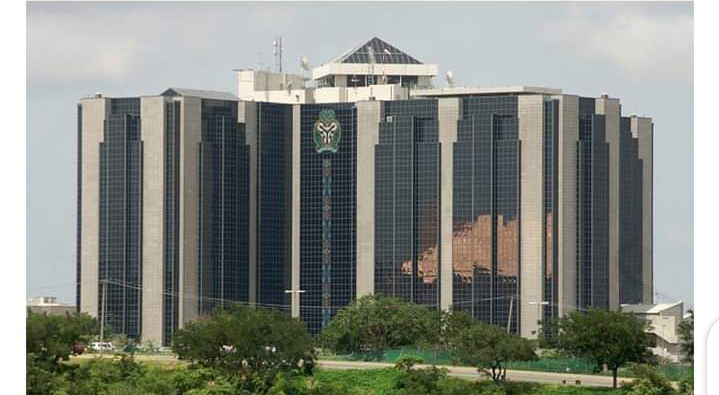

The Central Bank of Nigeria (CBN) has directed deposit money banks in the country to start charging 0.5% cybersecurity levy on some transactions done by their customers.
The apex bank gave the directive in a circular dated May 6, 2024 and sent to all commercial, merchant, non-interest and payment service banks as well as mobile money operators and payment service providers.
“Following the enactment of the Cybercrime (Prohibition, Prevention, etc) (amendment) Act 2024 and pursuant to the provision of Section 44 (2) (a) of the Act, ‘a levy of 0.5% (0.005) equivalent to a half percent of all electronic transactions value by the business specified in the Second Schedule of the Act’, is to be remitted to the National Cybersecurity Fund (NCF), which shall be administered by the Office of the National Security Adviser (ONSA),” the circular partly read.
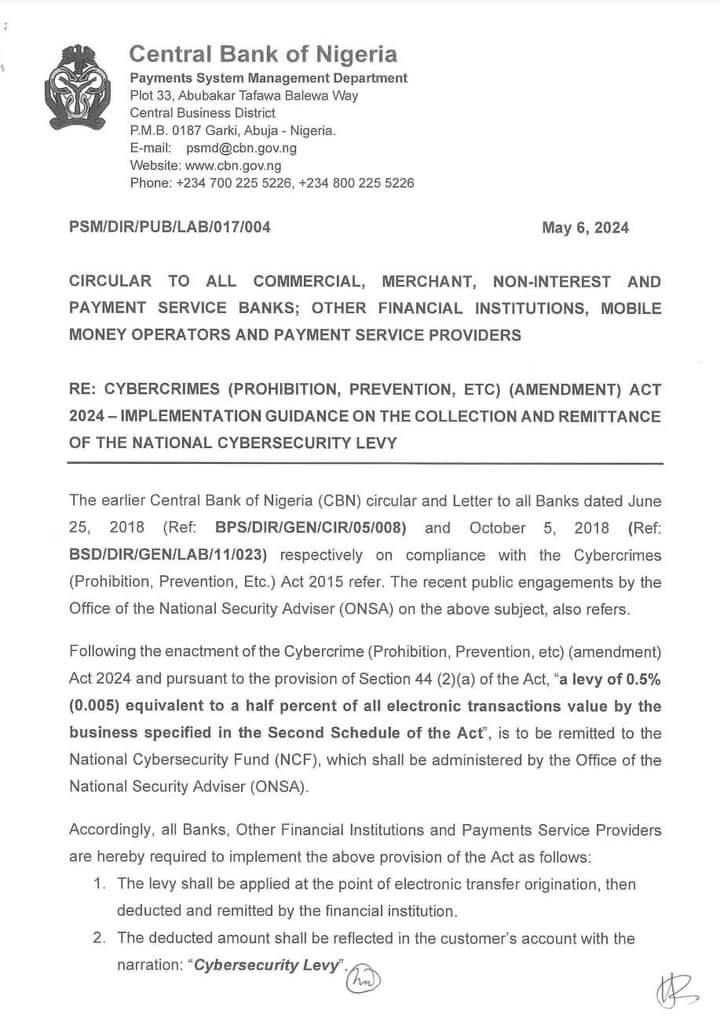

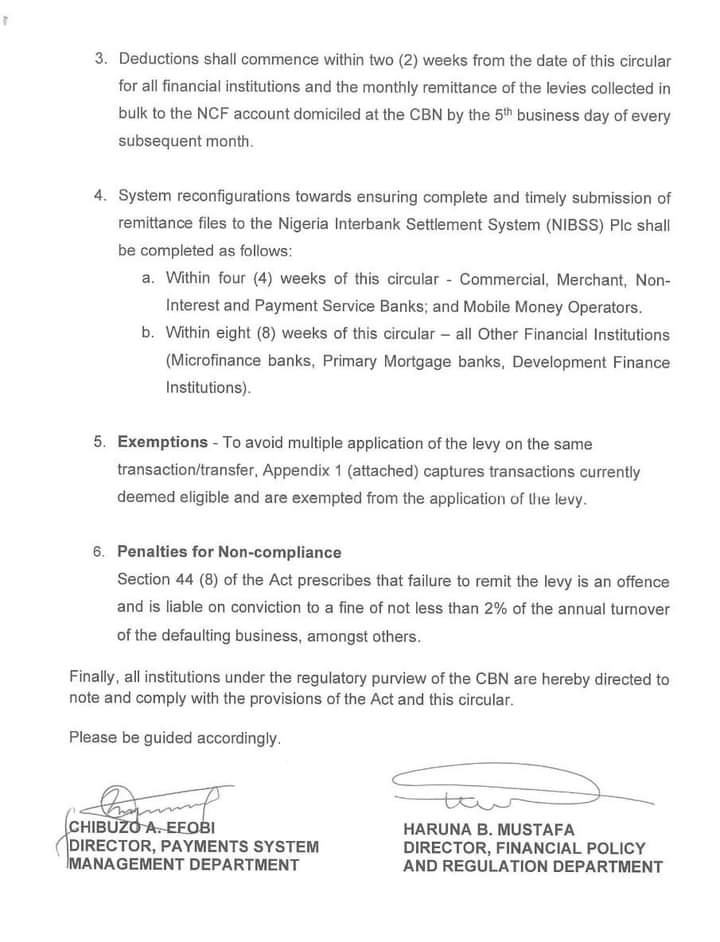

The apex bank said that the implementation of the levy would start two weeks from the date of the circular.
“The levy shall be applied at the point of electronic transfer origination, then deducted and remitted by the financial institution. The deducted amount shall be reflected in the customer’s account with the narration, ‘Cybersecurity Levy’. Deductions shall commence within two weeks from the date of this circular for all financial institutions and the monthly remittance of the levies collected in bulk to the NCF account domiciled at the CBN by the fifth business day of every subsequent month,” the circular said
The apex bank added that this new levy will not be applied on transactions such as loan disbursements and repayments, salary payments, intra-account transfers within the same bank or between different banks for the same customer, intra-bank transfers between customers of the same bank.
Also exempted from the levy were inter-branch transfers within a bank, cheque clearing and settlements, Letters of Credits, Banks’ recapitalisation-related funding only bulk funds movement from collection accounts, savings and deposits including transactions involving long-term investments, among others.
This current implementation however is not sitting well with some netizens as they reacted to the new development.
Here were some of their reactions from X.
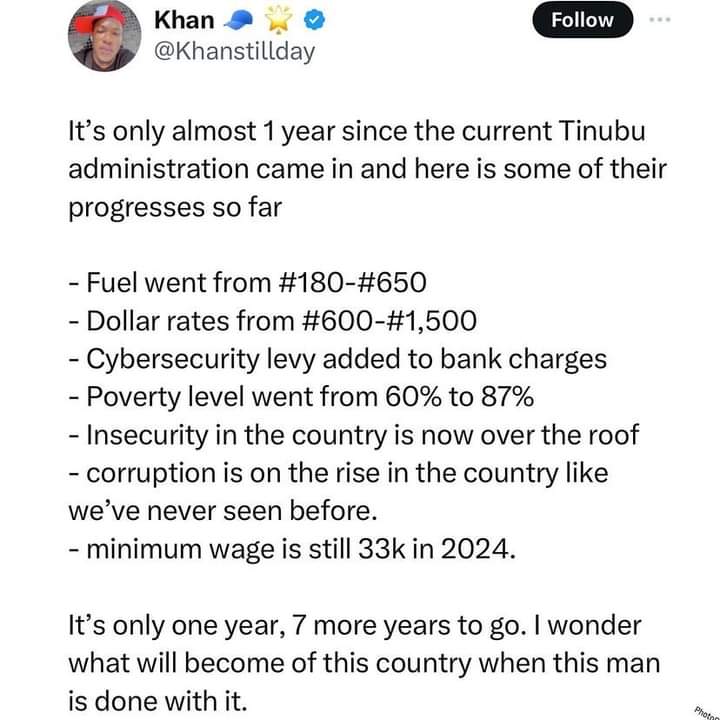



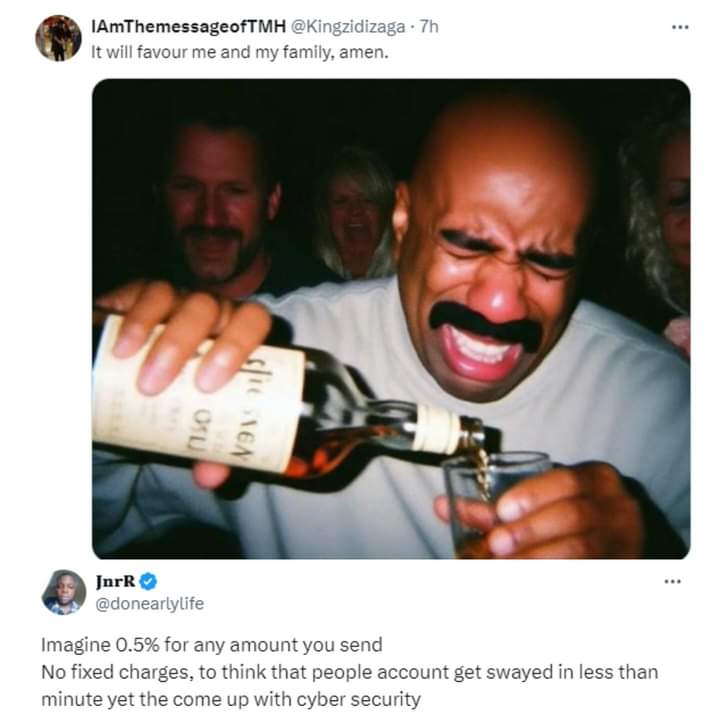

Finance
EFCC Chairman Tasks Nigerian Youths Against Crimes And Fraudulent Acts


The Chairman of Economic Finance Crime Commission (EFCC), Ola Olukoyede, has stressed the need for Nigerian Youth to see themselves as agents of positive change that have a lot to contribute to the socioeconomic development of the Nation.
Speaking at the 2nd edition of a Leadership Trainings Programme in Abuja, Olukoyede, who was represented by the Head Enlightenment and Re-orientation unit, (EFCC), Aisha Mohammed, said the commission’s dream is to see the youth contribute meaningfully to the society, emphasizing on the need to work together in bringing positive change to society.
The Economic and Financial Crimes Commission Boss declared the readiness of his agency to work with all Stakeholders, including the youth towards changing the narrative and reposition the country to greater exploit.
Also speaking, the representative of the Executive Secretary of Tertiary Education Trust Fund (TETFUND), Sonny Echono, appealed to the youths is to eschew social vices that could deter their full potential in life.
Other speakers at the event, including the Chairperson, Zero Tolerance for Social Immoralities Initiative (ZEITI) Africa, Rasak Jeje called on all stakeholders to join hands in collective pursuit of empowering new generation of leaders to curb the rising tides of social Vice among Nigerian youths.
The Chairperson, Zero Tolerance for Social Immoralities Initiative (ZEITI) Africa, Rasak Jeje made the call while addressing journalists at the 2nd edition of it Leadership Trainings Programme in Abuja on Thursday.
He said the training was aimed to intimate students leaders with knowledge and insights that will help them drive positive change and become exemplary leaders in their respective spheres.
Finance
AISA Has Refunded The Fees Paid By Yahaya Bello To EFCC


The Economic and Financial Crimes Commission (EFCC) says the American International School Abuja (AISA) has refunded the fees paid by the immediate past governor of Kogi state, Yahaya Bello, for his children attending the school.
In response to a letter addressed to the Lagos zonal commander of the EFCC, the school said $845,852 was paid in tuition “since the 7th of September 2021 to date”.
AISA said the sum to be refunded is $760,910 because it had deducted educational services already rendered.
“Please forward to us an official written request, with the authentic banking details of the EFCC, for the refund of the above-mentioned funds as previously indicated as part of your investigation into the alleged money laundering activities by the Bello family.
Since the 7th September 2021 to date, $845,852.84 (Eight Hundred and Forty-Five Thousand, Eight Hundred and Fifty Two US Dollars and eighty four cents) in tuition and other fees has been deposited into our Bank account.
We have calculated the net amount to be transferred and refunded to the State, after deducting the educational services rendered as $760,910.84. (Seven Hundred and Sixty Thousand, Nine Hundred and Ten US Dollars and Eighty Four cents).
No further additional fees are expected in respect of tuition as the students’ fees have now been settled until they graduate from ASIA.”
In a chat with The Cable, the spokesperson of the EFCC, Dele Oyewale, confirmed that the school has refunded the money.
‘’The money has been paid into public account,” Dele Oyewale was quoted as saying
-



 Politics4 days ago
Politics4 days agoFuel Scarcity Will Soon Be Over – Senate Leader Says
-



 News3 days ago
News3 days agoFirst Man To Receive Pig Kidney Transplant Has Died
-



 Health3 days ago
Health3 days agoFP2030 Report Links Family Planning & Gender Equality
-



 Politics3 days ago
Politics3 days ago“Supporting Sim Fubara Was A Mistake” – Wike Announces
-



 News2 days ago
News2 days agoMath Teacher Accused Of Having Sex With 2 Students And Getting Pregnant For One Tearfully Reveals The Baby Was Taken Away From Her
-



 Politics2 days ago
Politics2 days agoPresident Tinubu Bans Purchase Of Petrol-dependent Vehicles By FEC Members
-



 Entertainment16 hours ago
Entertainment16 hours agoMen Of The Lagos State Police Command Have Arrested Singer Portable






